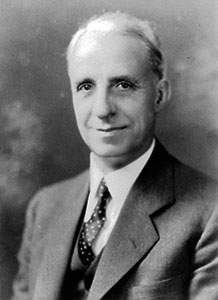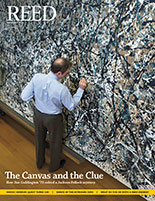
IRIS login | Reed College home Volume 92, No. 3: September 2013
The Inner Coleman
By David C. Coleman ’60
 In light of the celebration of Reed’s centennial in 2011, I am offering a brief perspective on the eventful life of my grandfather, President Norman Frank Coleman [Prexy 1925-34], a century after he arrived to teach at the college. A little more than a decade later, he would become Reed's third president.
In light of the celebration of Reed’s centennial in 2011, I am offering a brief perspective on the eventful life of my grandfather, President Norman Frank Coleman [Prexy 1925-34], a century after he arrived to teach at the college. A little more than a decade later, he would become Reed's third president.
Coleman was one of the pioneer faculty members at Reed, having been recruited during the college’s first year when classes were convened in downtown Portland. Though he was one of the first to teach English at Reed, his major claim to his fame comes from a phrase in his acceptance letter to President William T. Foster, expressing his desire to join “the comrades of the quest.” From this phrase arose the name of Reed’s student newspaper.
Coleman was born in 1874 on a farm near Sarnia, Ontario, Canada; the third of six siblings, all of whom went on to earn advanced degrees in English or biology. He attended the University of Toronto, graduating in 1899 with a BA in biology with highest honors. He taught English in high schools in the Spokane, Washington, area for several years before accumulating enough savings to attend Harvard College [University], in 1905–07; he earned an MA in English literature. (Later, in 1924, he was awarded an LLD from Mills College.) He then married Ethel May Fleming, his sweetheart of many years, in August 1907, and moved to Whitman for his first college teaching appointment.
Coleman had a very impressive personality, indeed presence. He was tall (6 feet 3 inches) and handsome, with an olive-colored complexion. He had a mellow baritone voice that carried well when he taught or presented lectures. The family agreed that Norman Coleman was very “Lincolnesque” in physique and demeanor, minus the high-pitched tenor of our 16th U.S. president. I knew him only in his old age, but was fascinated by his quiet reserve, his cryptic sense of humor, and his love of good music.
Although he was a quintessential academic, who loved to read and reread many of the classic works of the Romantic poets in his long retirement, Coleman’s lifelong passion was devoted to the peaceful resolution of conflicts on regional and global scales. The phrase “world peace” sounds quaint now, but one must view him in the context of his time. A proponent of liberal causes (he always admired Woodrow Wilson), Coleman strongly supported hopes and aspirations for global peace during and after World War I.
The entire Coleman family spent several months touring in Japan in early 1925. The purpose of the trip was to “assess the sentiment of the Japanese people as a result of the American exchange party of young men.” Coleman wrote a six-part series on conditions in Japan, which appeared weekly in the Oregonian. Coleman’s travelogue of the trip was graphic and insightful. The travelogue began with accounts of sights seen and many signs of friendship. By the fourth dispatch dated July 29 from Miyashima, Japan, Coleman noted the resentment and irritation felt because of the new alien exclusion law passed by the U.S. Congress (targeted at Asian countries). Students, in massive demonstrations in Tokyo and other cities, warned of the impact of this legislation, hoping for “enlightenment” and action by Congress. In mid-August that same year, Coleman noted, “ominous times pass,” referring to talk of boycotting all things American, perhaps even deporting Americans from Japan. He wrote that the depth and extent of those feelings were likely to produce some repercussions in future years. I never asked him directly during my Reed years (1956–60), but my impression is that the attack on Pearl Harbor on December 7, 1941, was not a complete surprise to him.
Near the end of that trip to Japan, a telegram from Reed’s trustees arrived for my grandfather in Tokyo. It announced the sudden death of Richard F. Scholz [president 1921–24] and requested that my grandfather return to the college to serve as its president.
Historical accounts of the years of Coleman’s presidency [1925–34] portray a time of consolidation and quiet stewardship. From comments he made in letters to my father, Francis Coleman, and chats I had with my grandfather during my years at Reed, the times were anything but quiet and steady. Coleman was under constant pressure from the trustees to raise money, which he was able to do somewhat successfully in the first four years, leading to the building of the Hauser Library. The likelihood of any major funding coming in after early 1930 was, of course, nil. Coleman was happy to step down to a regular professorship. (During his presidency, as was his wont, he continued his teaching, offering a freshman composition course and others.)
Coleman was quite peripatetic. During World War I, he took extended leaves of absence to serve as a secretary to YMCA International in Paris. In the early ’20s, he also was president of the Loyal Legion of Loggers and Lumbermen—an alliance of timbermen that tried to achieve labor peace in the turbulent times during and just after World War I.
In fall 1929, Coleman made another trip to the Orient. In a November 15 dispatch to the Oregonian, “Chinese relationships and causes of friction with neighbors to the North and South,” he commented on Chinese accusations against Japanese control of Manchuria. One week later, he sent a dispatch: “Strange status of Shanghai brings danger to Far East.” He mentioned a rising nationalism demanding control of the international city of Shanghai.
More than 75 years later, one wonders about the impact that such extensive travel and work had on behalf of the cause of peace and understanding, in the years of the League of Nations and in the interim between the two world wars. Apparently the dispatches that he sent to the Oregonian were very well received.
Coleman was quite active in retirement, due in part to his having very little savings to draw upon. He mentioned to me once that the Reed board of trustees offered to pay him a small pension if he would pay into its newly established pension plan for one year before he retired in 1939. When I naïvely asked him if he took them up on the offer, he smiled and said, “Oh no. That would have been unethical.” His equities having lost most of their value in the Great Depression, this forbearance is all the more impressive. Thus the retirement income of Norman and Ethel Coleman was sparse indeed.
In 1940-41, Coleman taught English at Macalester College in Minnesota, and in 1941-42 he taught at Spelman College in Atlanta. He lectured throughout the South on behalf of the Studebaker Foundation in 1942-45. The lectures during World War II addressed the need to pursue world peace and the establishment of the entity that became the United Nations in 1945. Later in retirement, in the early postwar years, my grandparents moved back to the area around Milwaukie, Oregon.
After spending a year (1949–50) with my family in San Diego, my grandparents returned to Portland, where Coleman was employed as a guide and caretaker at the Oregon Audubon Bird Sanctuary on Northwest Cornell Road. In their final years, my grandparents had free use of a small cottage at the sanctuary and gratefully accepted a small monthly stipend that the Reed trustees had voted to provide beginning in 1957. My grandfather passed away in his sleep in August 1960, predeceased by my grandmother only three months earlier.
Viewing Reed from the perspective of a half-century since my graduation, and a full century since Norman Coleman and his small family arrived in Portland, the overall esprit and dynamism, indeed the “quester” motif that characterized the campus then seems as prevalent as ever. The physical surroundings, with many vastly expanded buildings and facilities—not to mention the 100-fold increase in the endowment over the last several decades—are much changed, but do enhance the overall mission of providing the milieu for a truly liberal education.
Acknowledgments: I thank Denis Floyd, Anne Wood Squier ’60, and my wife, Frances, for encouraging me to write this historical account.

LATEST COMMENTS
steve-jobs-1976 I knew Steve Jobs when he was on the second floor of Quincy. (Fall...
Utnapishtim - 2 weeks ago
Prof. Mason Drukman [political science 1964–70] This is gold, pure gold. God bless, Prof. Drukman.
puredog - 1 month ago
virginia-davis-1965 Such a good friend & compatriot in the day of Satyricon...
czarchasm - 4 months ago
John Peara Baba 1990 John died of a broken heart from losing his mom and then his...
kodachrome - 7 months ago
Carol Sawyer 1962 Who wrote this obit? I'm writing something about Carol Sawyer...
MsLaurie Pepper - 8 months ago
William W. Wissman MAT 1969 ...and THREE sisters. Sabra, the oldest, Mary, the middle, and...
riclf - 10 months ago